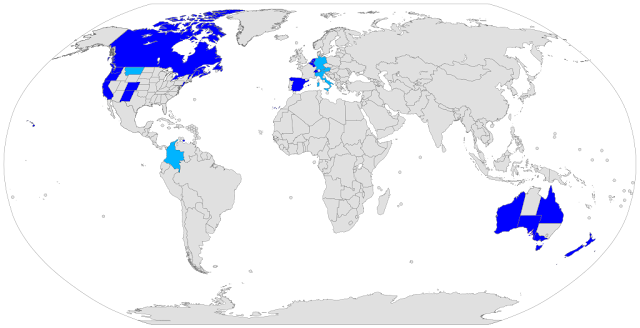“De Hogeweyk” the village for people with Dementia or Alzheimer
A very special nursing home has been set up in the Netherlands that aims to restore freedom and dignity to every patient and alleviate the symptoms of the disease. It is the village “De Hogeweyk” near Amsterdam, a kind of "movie set" where health workers play the role of bar, supermarket or post office workers and patients feel like they are living as normal a life as possible. Residents in need of care have 'a maximum freedom of movement', a kind of chance for 'a kind of normal daily routine' and an widely active life. The operator relies on an innovative and now widely respected care concept that is based on the needs of people with dementia.
Here is an interesting report - CNN's World's Untold Stories: Dementia Village
Constantly monitored
The inhabitants. the residents, the patients are constantly monitored by cameras and medical professionals, 24 hours a day, without them even realizing it. The village is specifically designed for people with severe Alzheimer's disease and those with severe dementia. The project developed from a retirement home that existed until 1992. A pilot project started in 1993 and construction of the village began in 2007.
The Netherlands started a national dementia program back in 2004. The aim of a huge number of pilot projects was to create a needs-based care offering that meets the wishes and different needs of patients - if I am right Netherlands started about 60 projects all in all. Another goal was to improve advice and support for family carers. However, with 3.5 percent of gross domestic product, the Netherlands is also the leader in Europe when it comes to public spending on geriatric care. In Germany, where significantly more seniors are cared for at home, the number is just one percent.
Don't get me wrong - to a huge extend I like the project - and it gives these people a good chance for 'a kind of normal life' - but here comes the 'but' my collywobbles or even gripes or lets call it anguish.
But isn't the success of this project the the drawback and other side of the shield of our society - a society who can not deal with dementia?
Keeping people with dementia separated and secured is a common practice, based on the reasonable idea of safety first for the vulnerable. Isolation and segregation create and reinforce another kind of barrier to those with dementia: that of stigma, which can rob people of quality of life, personal agency and the dignity of risk the rest of the population expects as a birthright.
Research shows that experiencing stigma is increasing feelings of social isolation, depression and abandonment among those with dementia. This stigma exists worldwide, and trying to educate people at remove from those with dementia has not proved effective at reducing it
Despite a huge number of good reasons and limitations we have to be aware of - I firmly believe that there is reason to feel optimistic that aging-friendly programs can be applied to dementia. I believe that if more people without memory loss interact and create friendships with those who have it, stigma will decrease. Adopting attitudes of inclusion based on personal experiences could result in friendlier, more equitable communities.
People with dementia cannot help forgetting. So it is up to us to remember that they are important members of society who deserve lives as connected and meaningful as our own.
A dementia-friendly society and communities would adapt physical and social aspects of an environment to ensure well-being and continuity of life for everyone. Related activities could help move communities worldwide from segregation to tolerance to true inclusion of all people as we age.
Dignity is an important component of quality of life and a core value of professional and family nursing care.
Links:
The website of dementia village “De Hogeweyk”
Articles in this context:
Disabled Living - Solutions for Safer and Independent Living
Showing article with the label caregiver
Showing article about nature of dignity and human dignity






Comments
Post a Comment